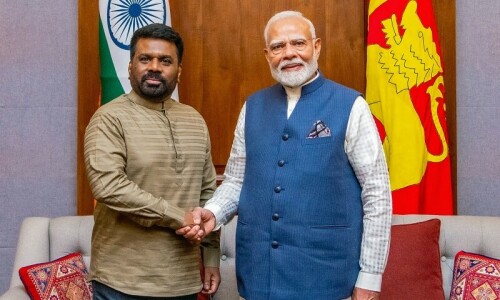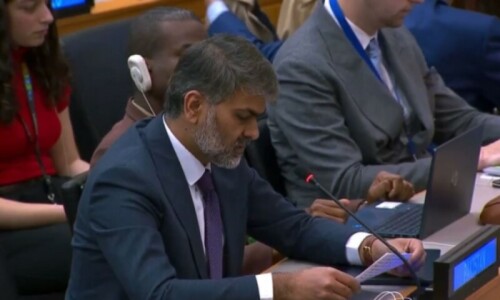It was an astonishing news conference in every way. With protesters gathered outside parliament, controversy over counter-terrorism operations in Punjab raging and a joint investigation team in India to probe the Pathankot air base attack, ISPR chief Lt Gen Asim Bajwa and Information Minister Pervaiz Rashid held a joint media briefing to discuss the anti-Pakistan activities of captured Indian spy Kul Bhushan Jadhav.
While questions remain about the exact nature of Mr Jadhav’s activities in Balochistan and the circumstances of his arrest, it is obvious that India has a great deal to answer for.
Moreover, the weak and confused denials of Indian officials so far has added to a sense that the Pakistani version of events surrounding Mr Jadhav is far closer to the truth than the Indian version.
After years of unproven allegations, the Pakistani state has rather dramatically produced evidence of Indian interest and interference in Balochistan.
Perhaps what is most impressive is that the capture of an Indian national by Pakistan has not led to a meltdown in relations altogether. Had Mr Jadhav been captured a year ago, it is more than likely that the already tense bilateral relationship would have plummeted to yet another low.
But on Monday, neither Lt Gen Bajwa nor Information Minister Pervaiz Rashid tried to whip up a frenzy. Instead, both men spoke in calm, measured tones and the thrust of the news conference was to ask India to cease its anti-Pakistan activities.
In India too there has been a relatively muted reaction given that an Indian national has been shown confessing on national TV in Pakistan. Yet, it is in the continuing work of the Pathankot JIT that a real sense of perspective has been maintained.
In Pakistan allowing the investigators to go to India and the latter receiving them and permitting them to work as planned, both states have shown that the Jadhav affair is not going to overrule and cancel all other crucial issues.
While prime ministers Nawaz Sharif and Narendra Modi will now not meet in Washington after the former cancelled his trip in the wake of the Lahore park attack, it is hoped that a meeting elsewhere will be possible soon.
On the spy issue, the state here must resist any pressure to turn it into a Raymond Davis-type fiasco. Instead of a public trial leading to all manner of nationalist and anti-Indian sentiment being unleashed, the fate of Mr Jadhav and the broader issue of spying between Pakistan and India should be worked out between the two states.
If at the height of the Cold War, the US and the Soviet Union were able to manage the issue of spies captured, surely there is a way for Pakistan and India to do the same.
More troubling, though, is the allegation of going beyond mere spying and actively stirring unrest inside Pakistan. A new set of rules needs to be drawn up on that front.
Published in Dawn, March 31st, 2016















































